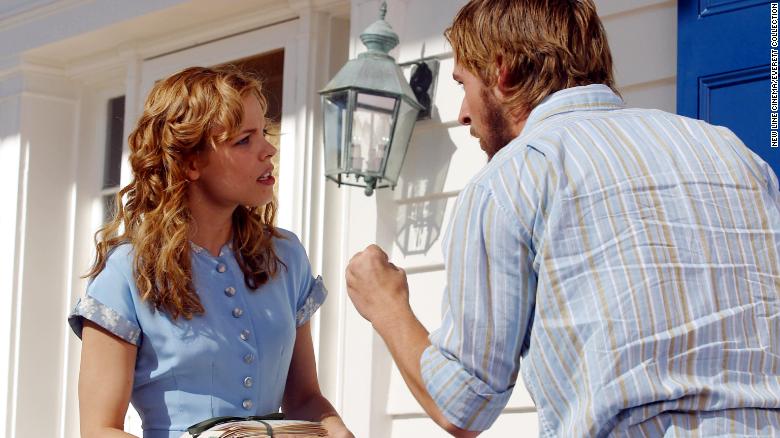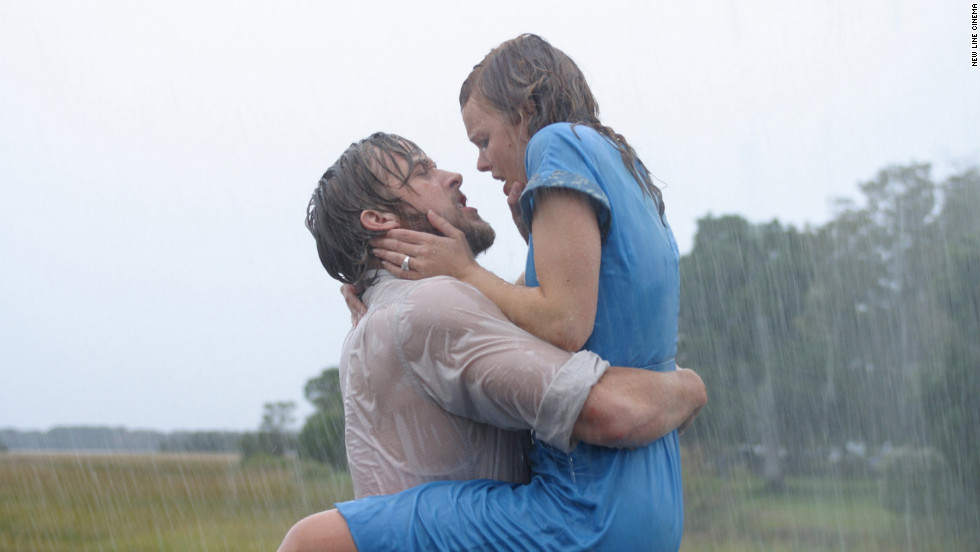Sara Stewart is a film and culture writer who lives in western Pennsylvania. The views expressed here are solely hers. View more opinion articles on CNN.
Recently, I wrote a piece about how classic movies we once loved can disappoint us in hindsight. After mulling the relationships and romantic ideals depicted in three of my comfort-watch favorites (“Pretty in Pink,” “Reality Bites” and “The Notebook”), I found I’m no longer very comfortable watching any of them.
I couldn’t help cringing as I reevaluated what Hollywood has presented as idyllic true love. Why was it OK to depict a woman being bullied or manipulated in the name of romantic obsession? Why are screaming fights so often shown as a precursor to everlasting love? And why have male characters been given so much leeway, over the decades, to behave terribly towards women and still emerge as romantic heroes?
As a critic, I get lots of feedback, especially when writing about films with a high nostalgia factor. But I was unprepared for the passionate, personal nature of the messages readers sent (and nary a slur among them: Kudos, CNN.com readers!). They came from both women and men, with many telling me they were relieved to see someone saying out loud what they’d long believed. Some offered the grim revelation that their own lives had mirrored these romantic movie tropes — at their peril.
Ibrahim in San Diego wrote, “I wonder if the media we’ve all been consuming has led to women putting up with ‘bad’ guys because, in the movies, it all works out in the end.”
That’s a question fueling my interest in the confluence of movies and real life, a subject that’s grown thornier as we evolve as a culture and open up conversations we’ve previously avoided. I’ve always been a proud feminist, but for years I found ways of pushing my views to the back burner when convenient. (One of my favorite Onion stories ever: “Woman Takes Short Half-Hour Break From Being Feminist to Enjoy TV Show.”)
In recent years, that’s gotten harder. When I moved from New York City to a small town in 2015, I started volunteering at a domestic violence shelter. Answering a hotline and working with residents taught me how women get stuck in cyclical patterns of abuse, and that literally anyone can fall into the trap of idealized thinking about what romance really is.
A common piece of feedback I’ve gotten on my feminist reviews over the years is that, “it’s just a movie,” and this was no exception: In addition to the unusual volume of support and personal stories, there were those who disagreed with me. “Maybe it’s me, but guess what, movies aren’t reality! If everybody got along and there were no conflict or mystery, it wouldn’t be interesting to watch, would it?” wrote Charles. “All three of the movies you cite are about young love — and young love is the very stuff of Romantic Dramedy. It’s also principally about people who are idiots, whose frontal lobes are not yet fully formed. It’s why the genre isn’t called ‘Reasonable, Mature Companionship’ movies,” another reader, Duff, pointed out.
If you’re able to watch “The Notebook” with a certain remove, sure, it can function as dramatic entertainment and nothing more. But I’d argue when the result of absorbing decades of misogynist fairy tales is a terrible relationship that does lasting damage to your psyche and/or your body, it’s not just a movie anymore. It’s real life. And the more I talk to people who’ve gotten out of abusive relationships, the more necessary I realize it is to talk openly and often about the messages we’re all being fed through the Hollywood pipeline.
Several readers reflected on their own former toxic partners. “I keep wondering how I could have kept going despite all the red flags and being mistreated,” wrote 31-year-old Liz in Chicago. “This article validated that we see these stories as romanticized, and are told that if we love a man hard enough despite his flaws, he will change.”
Megan had a similar experience. “I dated a guy with a lot of the same over-dramatic, ‘we’re just like The Notebook’ B.S.,” she wrote. “He tried a lot of this mind crap on me: ‘We fight because we’re passionate and we care,’ ‘No one else will ever love you like I do.’ Fast forward to a much-needed breakup and finding the love of my life a few years later. And you know what? It was easy.”
A reader in Vancouver wrote, referring to the male leads in the three films I called out, “I chose — actually married, then divorced — a Blaine/Troy/Noah type. Although I have moved on, I still regret making that decision.”
Tracie in Texas told me of her current relationship with a man who still seems to take inspiration from fiction. “I have been dating someone for close to a decade and he often references movies,” telling Tracie she is “‘abnormal’ because I do not appreciate the gestures girls in movies seem to adore. I broke up with him several times, and he keeps making these attempts very similar to crazy movies. I say stalking, and he sees it as romantic.”
Men weighed in, too. Some described revisiting older films with a new sense of outrage. “My family and I watch these movies and spend a good portion yelling things like ‘WTF did he just say?’ and ‘Why are you interested in him, he’s awful!’,” wrote a reader named Jeremy.
Jack from Brentwood, Tennessee, pointed out it’s not only men behind these tropes: “Given the provenance of ‘You’ve Got Mail,’ ‘Pride and Prejudice,’ not to mention ‘Wuthering Heights’ — all authored by women — is this what women want? Is this what women think other women want?”
Is it an exaggeration to associate male violence with enduring film tropes about true love being inherently dramatic? Not according to one candid reader:
“Over the past seven years, I have been dealing with the fallout from a series of terrible choices, which led to my arrest and incarceration,” he wrote. “I received counseling that helped me learn to admit that I had been an abuser. I know many of my expectations on how relationships and interactions with women were ‘supposed to work’ were influenced by similar media exposure. This does not justify my behavior — I know I could have stopped, and chose to continue for selfish reasons — but it is important to identify patterns that can lead to the type of destructive behavior I engaged in. Perhaps if enough people do, there will be a change in how relationships are presented.”
In that spirit, I’d like to thank Sonali from San Diego for giving me an inspiring new project. “Can you write another article to highlight better examples of modern films, with authentic romance between a man and a woman” she asked. “I’d like to retrain my brain to seek stronger relationships and men. First step: reprogramming my entertainment input to set myself up for success.”
She’s so right. While it’s tempting to think of moviegoing as escapist, especially during times like these, the reality is we all need to seek out alternatives to damaging romantic distortions on screen. Happily, there’s help: The review aggregator CherryPicks is one great place to find feminist fare. More progressive women’s voices are finding a place in Hollywood, and more feminist men’s, too.
Just for some encouraging starters, these 10 modern directors have put out films with smart, nuanced, healthier relationships: Nicole Holofcener, Lynn Shelton, Sarah Polley, Joe Swanberg, Barry Jenkins, Nahnatchka Khan, the Duplass brothers, Greta Gerwig, Gillian Robespierre. Robespierre’s “Obvious Child,” Gerwig’s “Lady Bird,” and Khan’s feature debut “Always Be My Maybe” are my current favorites, but it’s worth checking out the entire resumes of everyone on this list.
Get our free weekly newsletter
Sign up for CNN Opinion’s new newsletter.
And yet, when it comes to older films, it’s my humble opinion that it is still considered fairly uncool, as a critic, to talk overtly about sexism. But the true stories people have so generously shared with me are reminders of what I see as the critic’s responsibility. So, I’ll keep calling it out when I see it — even in the movies I loved.
>>>>





